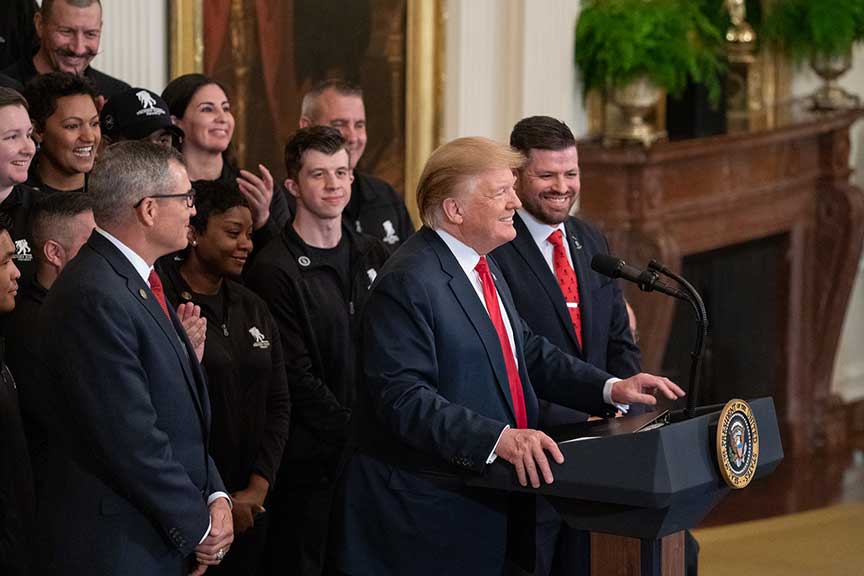Mueller report

President Trump on April 18, 2019
Special Counsel Robert Mueller completed his report and submitted to the Attorney General. The report that was redacted was made public on April 18, 2019, and stated that the Russian interfered in the 2016 elections, that the Trump campaign did not collude with the Russians although they welcomed their help. It outlines many events of obstruction of justice by President Trump, but the report stated it was up to Congress to interpret them.
Robert Mueller submitted his report to Attorney General William Barr on March 21. The Attorney General reviewed the report, and on March 24 he issued a letter that stated that the report indicated that there was no collusion with Russia and that Mueller could not decide whether there was obstruction, but he decided that as a matter of law there was no obstruction. Pressure immediate grew to release the actual report. Barr said he would as soon as he could redact the parts that needed to redacted due to national security, privacy, or ongoing investigations.
A redacted version of the Mueller Report was given to Congress on April 18th. The report was over 400 pages long. It was divided into three parts. One part dealt with the Russians interference in the elections, the second on whether there was “collusion” between the Trump campaign and the Russians. The third part was whether President Trump engaged in obstruction of justice.
As to the question of Russian interference, the report was unequivocal:
“The Russian government interfered in the 2016 presidential election in a sweeping and systematic fashion. Evidence of Russian government operations began to surface in mid-2016. In June, the Democratic National Committee and its cyber response team publicly announced that Russian hackers had compromised its computer network. Releases of hacked materials-hacks that public reporting soon attributed to the Russian government-began that same month. Additional releases followed in July through the organization WikiLeaks, with further releases in October and November.”
On the question of collusion, the report concluded that there was no conclusion, even though there were extensive contacts. The report stated:
“The social media campaign and the GRU hacking operations coincided with a series of connections between Trump Campaign officials and individuals with ties to the Russian government.
The Office investigated whether those contacts reflected or resulted in the Campaign conspiring or coordinating with Russia in its election-interference activities. Although the investigation established that the Russian government perceived it would benefit from a Trump presidency and worked to secure that outcome and that the Campaign expected it would benefit electorally from information stolen and released through Russian efforts, the investigation did not establish that members of the Trump Campaign conspired or coordinated with the Russian government in its election interference activities.”
It's important to note that when it came to collusion, the Special Counsel stated that there was no crime defined as collusion. Instead, he used the definition of coordination. Coordination however required an agreement in advance to take actions. So while the Special Counsel found many events where the Russians acted to advance the Trump campaign often at the request of Trump, however, they could not find evidence of any agreement in advance.
The final part of the report dealt with the question of Obstruction of Justice. The report outlined 11 events that could reasonably be considered as attempts to obstruct justice. The report stated that in most of the cases Trump did not succeed in actually obstruction justice since his orders were not carried out by his staff. In summary, the reports states that :
“Because we determined not to make a traditional prosecutorial judgment, we did not draw ultimate conclusions about the President 's conduct. The evidence we obtained about the President's actions and intent presents difficult issues that would need to be resolved if we were making a traditional prosecutorial judgment. At the same time, if we had confidence after a thorough investigation of the facts that the President clearly did not commit obstruction of justice, we would so state. Based on the facts and the applicable legal standards, we are unable to reach that judgment. Accordingly, while this report does not conclude that the President committed a crime, it also does not exonerate him.”
Mueller stated that they would not make a prosecutorial judgment since a President could not be indicted and therefore it was the role of Congress to decide whether a crime had been committed.
